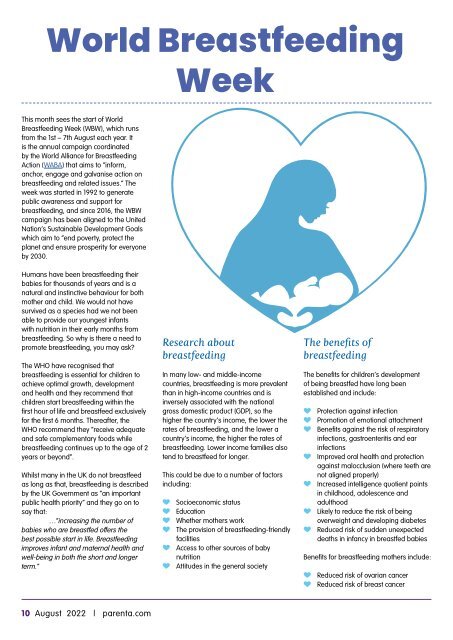August 2022 Parenta magazine
Create successful ePaper yourself
Turn your PDF publications into a flip-book with our unique Google optimized e-Paper software.
World Breastfeeding<br />
This month sees the start of World<br />
Breastfeeding Week (WBW), which runs<br />
from the 1st – 7th <strong>August</strong> each year. It<br />
is the annual campaign coordinated<br />
by the World Alliance for Breastfeeding<br />
Action (WABA) that aims to “inform,<br />
anchor, engage and galvanise action on<br />
breastfeeding and related issues.” The<br />
week was started in 1992 to generate<br />
public awareness and support for<br />
breastfeeding, and since 2016, the WBW<br />
campaign has been aligned to the United<br />
Nation’s Sustainable Development Goals<br />
which aim to “end poverty, protect the<br />
planet and ensure prosperity for everyone<br />
by 2030.<br />
Humans have been breastfeeding their<br />
babies for thousands of years and is a<br />
natural and instinctive behaviour for both<br />
mother and child. We would not have<br />
survived as a species had we not been<br />
able to provide our youngest infants<br />
with nutrition in their early months from<br />
breastfeeding. So why is there a need to<br />
promote breastfeeding, you may ask?<br />
The WHO have recognised that<br />
breastfeeding is essential for children to<br />
achieve optimal growth, development<br />
and health and they recommend that<br />
children start breastfeeding within the<br />
first hour of life and breastfeed exclusively<br />
for the first 6 months. Thereafter, the<br />
WHO recommend they “receive adequate<br />
and safe complementary foods while<br />
breastfeeding continues up to the age of 2<br />
years or beyond”.<br />
Whilst many in the UK do not breastfeed<br />
as long as that, breastfeeding is described<br />
by the UK Government as “an important<br />
public health priority” and they go on to<br />
say that:<br />
…“increasing the number of<br />
babies who are breastfed offers the<br />
best possible start in life. Breastfeeding<br />
improves infant and maternal health and<br />
well-being in both the short and longer<br />
term.”<br />
Week<br />
Research about<br />
breastfeeding<br />
In many low- and middle-income<br />
countries, breastfeeding is more prevalent<br />
than in high-income countries and is<br />
inversely associated with the national<br />
gross domestic product (GDP), so the<br />
higher the country’s income, the lower the<br />
rates of breastfeeding, and the lower a<br />
country’s income, the higher the rates of<br />
breastfeeding. Lower income families also<br />
tend to breastfeed for longer.<br />
This could be due to a number of factors<br />
including:

















